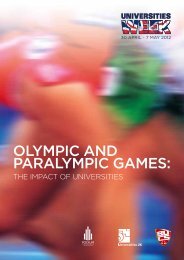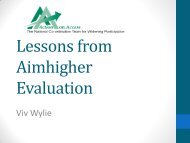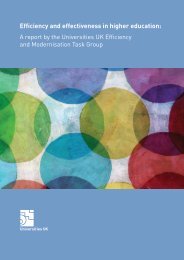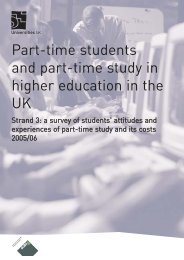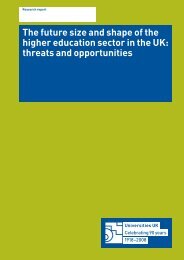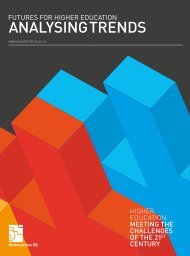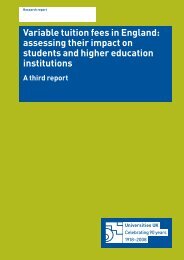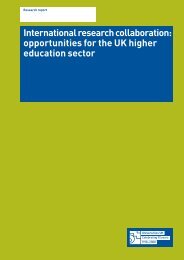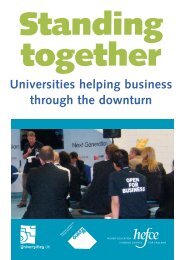The future of research - Universities UK
The future of research - Universities UK
The future of research - Universities UK
You also want an ePaper? Increase the reach of your titles
YUMPU automatically turns print PDFs into web optimized ePapers that Google loves.
<strong>Universities</strong> <strong>UK</strong> – <strong>The</strong> <strong>future</strong> <strong>of</strong> <strong>research</strong><br />
19<br />
Rec 4 BIS should enhance schemes to enable <strong>research</strong>ers and industrialists<br />
to exchange places for three or six-month periods, which means engaging<br />
with motivation. This will increase dialogue, enable <strong>research</strong>ers to acquire<br />
understanding <strong>of</strong> industrial problems, and enable industrialists to mentor young<br />
<strong>research</strong>ers in new perceptions <strong>of</strong> problem identification. (See also Rec 15).<br />
Rec 5 <strong>Universities</strong> should look at strategic partnerships in terms <strong>of</strong> tangible,<br />
long-term commitments, rather than only academic exchange and short-term<br />
student recruitment. At the moment, the <strong>UK</strong> is in a position to strike a good<br />
bargain because it has much to <strong>of</strong>fer. But the balance will change and when<br />
strategic partnerships become a necessity, it may find a scarcer availability <strong>of</strong><br />
good partners.<br />
Rec 6 Research Councils, other funding bodies and HEIs should consider<br />
enabling a much larger proportion <strong>of</strong> academic staff they support, to gain<br />
overseas experience, with funded sabbaticals in other <strong>research</strong> economies.<br />
Rec 7 <strong>Universities</strong> should work with schools to assert the need for competence<br />
in a foreign language as a prerequisite for a <strong>research</strong> career in any field. <strong>The</strong>y<br />
should work with the Funding Councils to strengthen appropriate provision in<br />
modern languages for their own <strong>research</strong> staff.<br />
Rec 8 Research Councils and BIS should expand current investment in<br />
international mobility when financial flexibility once again allows. One way<br />
might be for BIS, through the Research Councils, to <strong>of</strong>fer an enhanced salary plus<br />
a completion bonus on a <strong>research</strong> studentship when at least 12 months have<br />
been spent studying in an overseas university (but at only marginal cost to the<br />
Research Council, which would otherwise see this as a constraint on numbers <strong>of</strong><br />
studentships). An even larger premium could be <strong>of</strong>fered to those who choose<br />
to work in one <strong>of</strong> the emerging <strong>research</strong> economies. <strong>The</strong> net gain to the <strong>UK</strong> in<br />
terms <strong>of</strong> collaborative links, knowledge <strong>of</strong> overseas activity and net expertise,<br />
would be very large. <strong>The</strong> cultural shift could be even more significant.<br />
Rec 9 <strong>The</strong> system needs to be stringent in building on TRAC to achieve<br />
sustainability. <strong>Universities</strong> should exercise greater oversight to ensure that<br />
investigators avoid taking on contracts that are not properly resourced.<br />
Investigators need to accept that they are project managers and must work to<br />
scope and cost projects more fully and then to work within resources. This echoes<br />
the 2010 report <strong>of</strong> the RC<strong>UK</strong>/U<strong>UK</strong> task group chaired by Sir William Wakeham 8 on<br />
financial sustainability and efficiency, which states that ‘it is not clear that institutions<br />
are actually using the metrics [provided by TRAC] as effectively as they might’ and<br />
concludes ‘that the use <strong>of</strong> metrics to analyse trends, can and should be improved.’<br />
Rec 10 Research Councils should consider resource ‘packets’ across the system,<br />
in a constructive way that reduces the lower value margin while enhancing<br />
the rest. For example, there could be fewer but better funded studentships to<br />
encourage high-quality candidates. Numbers <strong>of</strong> grant awards could be reduced,<br />
while <strong>research</strong> contracts must be properly costed and then fully funded. <strong>The</strong> HE<br />
<strong>research</strong> base can <strong>of</strong>fer this as support <strong>of</strong> quality over quantity.



